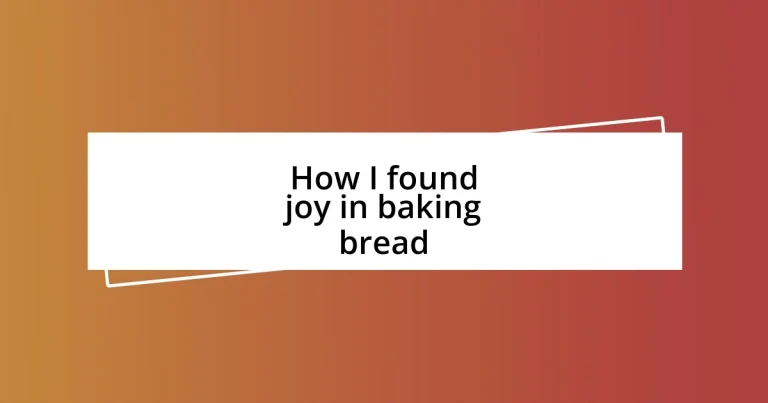Key takeaways:
- Discovering baking as a passion brought joy and a therapeutic escape, transforming simple acts into meaningful experiences.
- Mastering fundamental baking elements and using essential tools significantly improves bread-making outcomes.
- Embracing challenges and experimenting with flavors and techniques enhances creativity and enriches the baking journey.
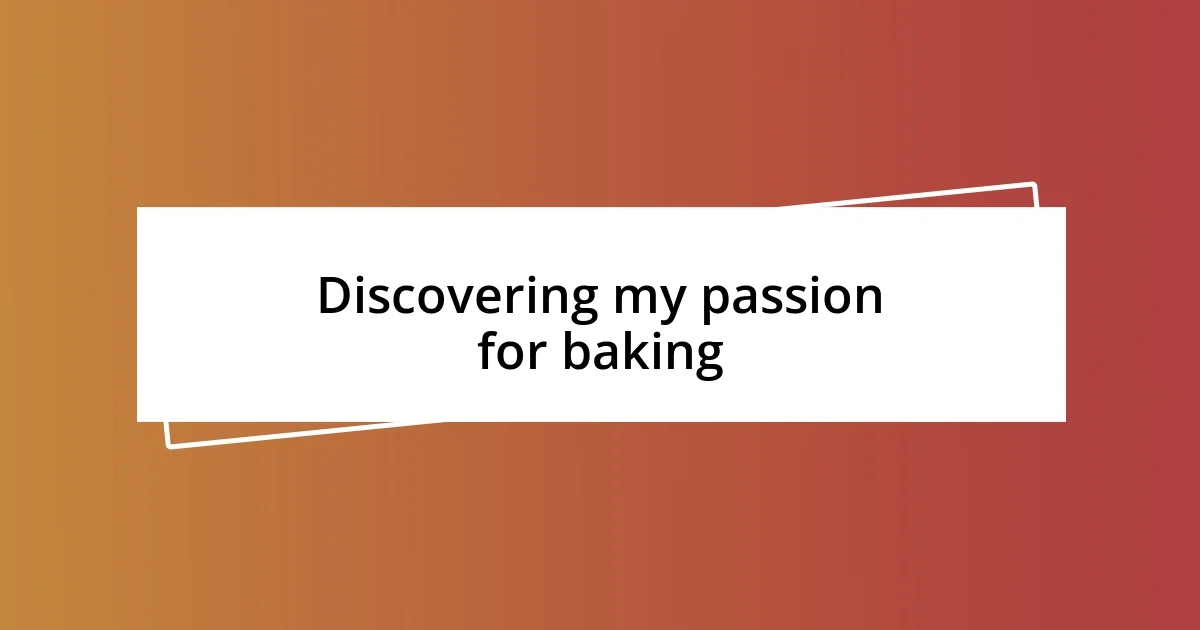
Discovering my passion for baking
The moment I learned to knead dough, I felt something shift within me. It was as if my hands were connected to a centuries-old tradition, a rhythm that soothed my soul. Have you ever experienced a simple act that transformed your mood? For me, it was shaping that soft, warm dough that sparked my passion for baking.
One Sunday, I decided to bake bread for the first time, driven by curiosity and a hint of apprehension. As I watched the ingredients come together—flour, water, salt, yeast—I felt a sense of purpose. There’s something incredibly rewarding about creating something from scratch. I remember sitting by the window with the aroma of baking bread wafting through the air. It was pure magic. Isn’t it fascinating how such a simple process can bring so much joy?
With every loaf I baked, I discovered not just a skill, but a form of therapy. There were days when the act of measuring flour and watching the dough rise became my escape from the chaos of life. It was during those moments, covered in flour and surrounded by the smell of freshly baked bread, that I truly found myself. Have you ever found joy in the mundane? For me, it was right there in the kitchen, rolling up my sleeves and diving into this delicious passion.
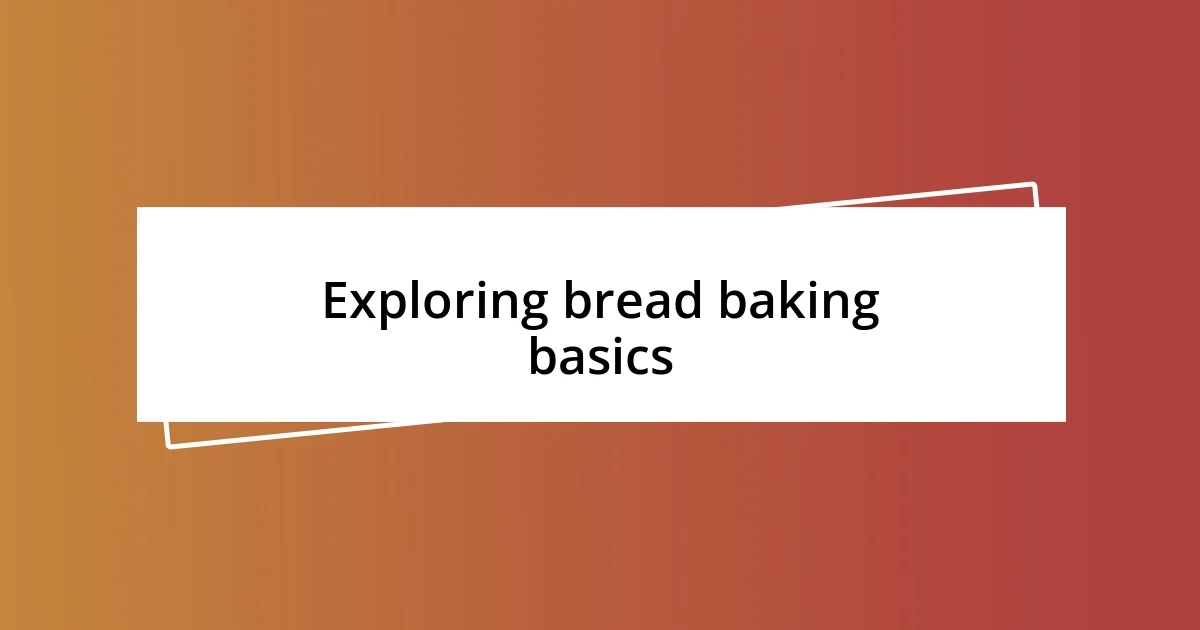
Exploring bread baking basics
When I first dove into the world of bread baking, I realized there are a few fundamental elements that make up the process. I was surprised to learn that mastering just a few basics could lead to the most satisfying loaves. The balance of ingredients, particularly the flour-to-water ratio, is crucial. Too much flour and your bread can become dense; too little, and it may not rise properly. I remember my first attempt, where I accidentally added way too much salt- a lesson learned the hard way!
Here are some essential components to focus on:
– Flour: Choose high-quality all-purpose or bread flour for the best texture.
– Water: Lukewarm water activates the yeast effectively, setting the stage for successful fermentation.
– Yeast: Instant yeast is my favorite for its convenience and reliability—no need to proof it beforehand!
– Salt: This ingredient not only enhances flavor but also strengthens gluten structure.
– Kneading: Develops gluten, giving bread its chewy texture; it’s a satisfying workout, trust me!
Each of these components plays a vital role in achieving that perfect loaf, and I love experimenting as I follow my instincts. Every time I step into my kitchen, it feels like a new adventure unfolding before me.
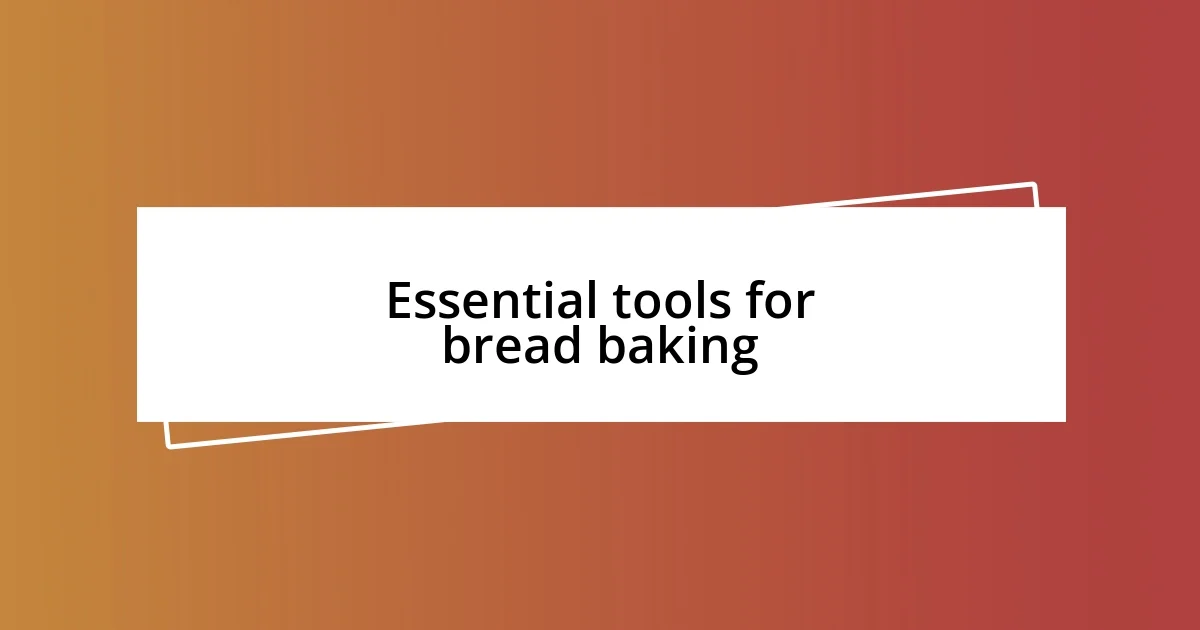
Essential tools for bread baking
When I first delved into bread baking, I learned that having the right tools can make a world of difference. For instance, a reliable kitchen scale is essential for precise measurements. I still remember the joy I felt when I weighed my flour for the first time. It felt like stepping into the shoes of a professional baker. Using a pastry scraper also became a game-changer for me. It helps divide dough neatly—not to mention, it minimizes the mess!
A high-quality bench scraper is one of the most underrated tools in a baker’s repertoire. It can streamline the process, making it easy to transfer shaped loaves from the countertop to the oven. Also, I can’t overlook the importance of a baking stone. I invested in one after reading about its ability to provide even heat—my bread’s crusts improved significantly!
Finally, don’t underestimate the value of a good dough thermometer. It’s a simple, yet essential tool to help ensure that your dough is at the perfect temperature for fermentation. Believe me, it makes all the difference in getting that airy, light texture. With these essentials, I feel armed and ready to tackle any bread recipe that beckons me in my kitchen!
| Tool | Purpose |
|---|---|
| Kitchen Scale | For precise measurements of ingredients. |
| Bench Scraper | Helps divide, transfer, and clean dough easily. |
| Baking Stone | Provides even heat for perfect crusts. |
| Dough Thermometer | Ensures optimal dough temperature. |
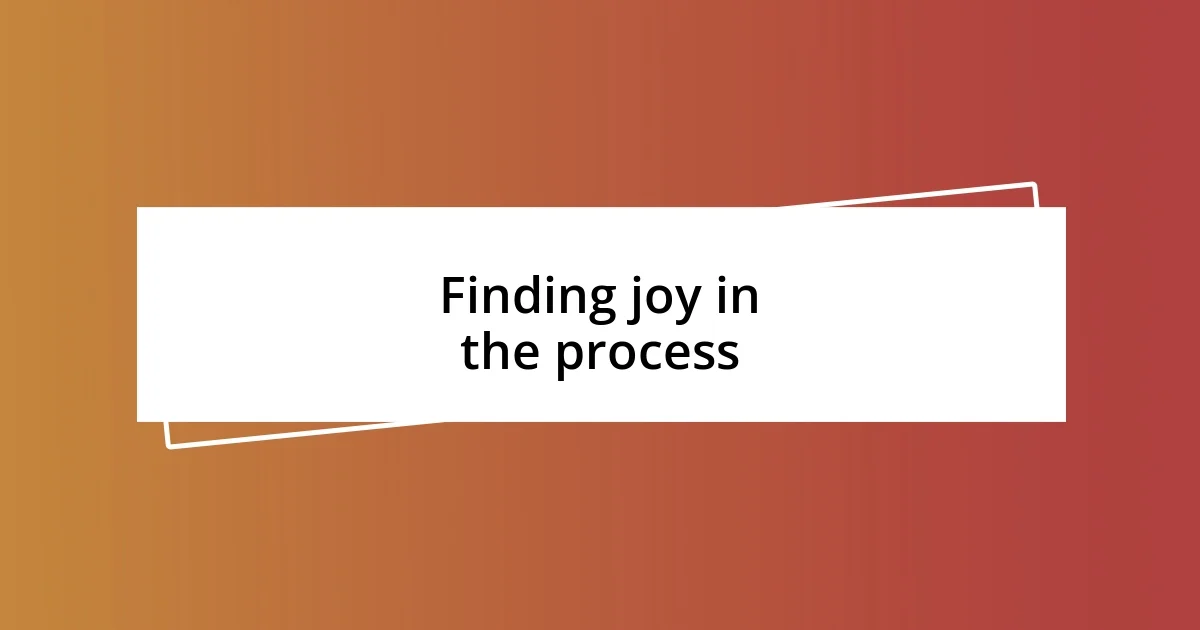
Finding joy in the process
Baking bread isn’t just about the end result; it’s an experience that requires patience and presence. I remember the first time I mixed the ingredients for my dough by hand. The feel of the flour slipping through my fingers and the satisfaction of seeing the ingredients combine was exhilarating. It made me realize that every knead and fold is like a meditation, pulling me into the moment and away from daily distractions.
As I watched the dough rise, it was as if I was nurturing a little life. The warm kitchen, the gentle stretch of the dough, and that anxious anticipation made my heart race with joy. Have you ever felt time stand still during a simple task? For me, that’s what happens in these quiet moments of bread-making. It’s about embracing the process, savoring the smells wafting through the air, and appreciating the transformation from simple components to something utterly delightful.
Finding joy in the process also means embracing the inevitable mishaps along the way. There have been times my dough didn’t rise as expected, and instead of feeling defeated, I found solace in experimenting further. Was it too cold in my kitchen? Did I use old yeast? Every failure turned into an opportunity to learn, and honestly, there’s a thrill in that. It’s this journey through trial and error that fortifies my love for baking, reminding me that each loaf carries not just ingredients but also stories, growth, and a bit of my heart.
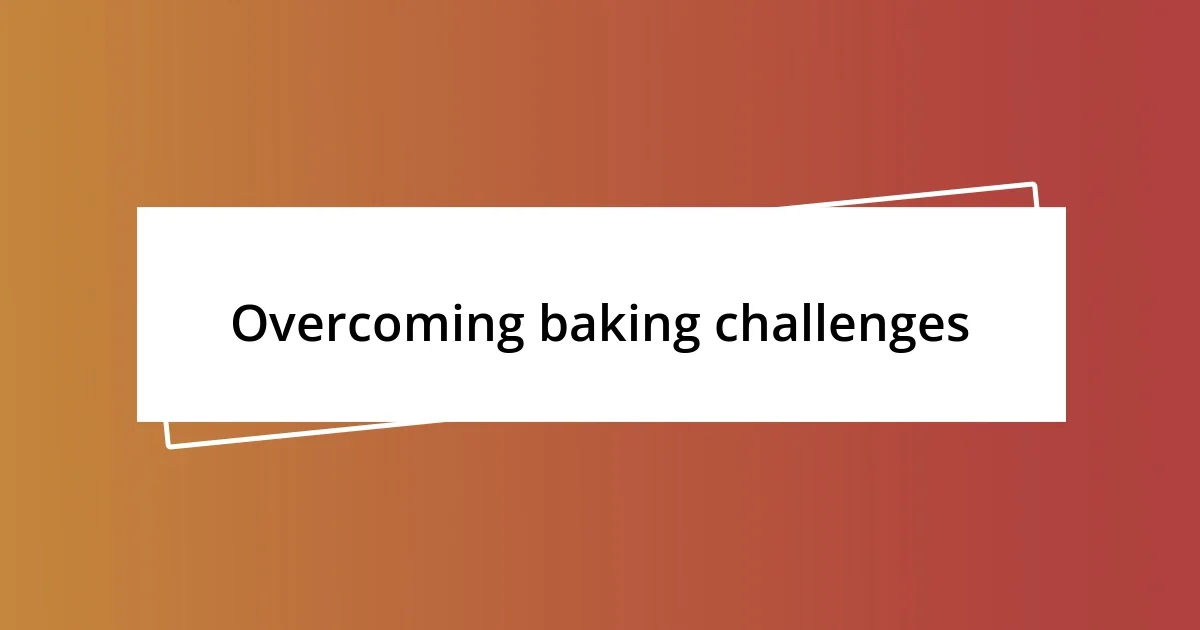
Overcoming baking challenges
Overcoming baking challenges is a path filled with moments of discovery. I’ll never forget the time I misjudged the water temperature for my yeast. Instead of giving up, I chose to adapt. Reading about proper fermentation temperatures opened my eyes to the idea that baking is as much about science as it is about art. That’s how I learned that a little adjustment could lead to a remarkable difference in the texture of my bread.
A major hurdle for many bakers is achieving that perfect rise. I remember the frustration of flat loaves, which often felt like a personal failure. But then, I began to keep a baking journal, tracking each attempt. Did the room feel too cool? Was my yeast still active? This practice not only pinpointed my missteps but also highlighted the nuances of each recipe, transforming my stumbles into valuable lessons. Have you ever tried such an approach? Letting a single challenge guide your exploration can turn baking into an intimate journey of self-improvement.
There are also days when the dough just doesn’t cooperate, and that’s perfectly okay. One particularly stubborn batch turned out overly sticky, which initially left me feeling defeated. However, rather than tossing it, I transformed it into a focaccia, brimming with herbs and olive oil. Sometimes, what seems like a disaster can lead to delicious surprises! Isn’t it fascinating how these little setbacks can add so much character to our baking stories? Embracing these challenges is part of what makes baking so rewarding and enjoyable for me.

Experimenting with flavors and techniques
Experimenting with flavors and techniques has become a delightful adventure in my baking journey. I remember the first time I decided to infuse my bread with rosemary and garlic. The aroma that filled my kitchen was intoxicating, transforming the simple act of baking into a sensory experience. Have you ever added an unexpected ingredient and been blown away by the result? For me, that was the moment I realized flavors can elevate bread from basic to extraordinary.
Trying different flour types also opened up a new world of textures and flavors. One day, I swapped regular all-purpose flour for whole wheat, and the change was astonishing. The bread was heartier, with a nutty flavor that made it feel more substantial. This led me to wonder why I hadn’t explored this sooner! Each change in ingredient was like turning a page in a cookbook filled with endless possibilities.
It’s thrilling to play with techniques too. The time I attempted a sourdough starter felt daunting, yet as I watched the bubbles multiply over days, my excitement grew. The tangy flavor and chewy crust it produced were worth every moment of waiting and nurturing. Don’t you love discovering something new about the process? For me, it’s these experiments that reveal the magic of baking—where creativity meets science and the results can often surprise and delight.












